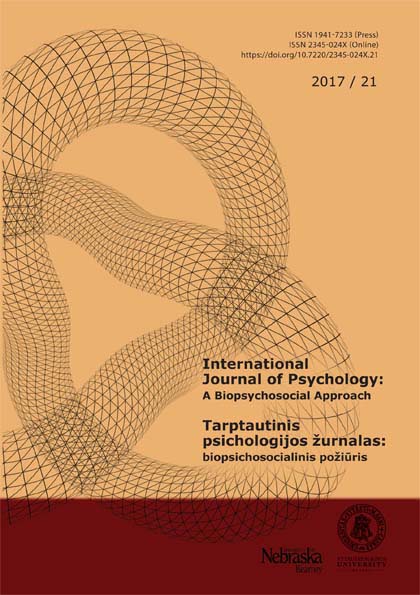Psichologinių ir socialinių veiksnių reikšmė subjektyviai vertinamam sėkmingam senėjimui Lietuvos vyresnio amžiaus žmonių imtyje
The Role of Psychosocial Factors in Self-Rated Successful Aging in a sample of Lithuanian Elderly People
Author(s): Loreta Gustainienė, Miglė Burauskaitė, Kristina KlemenytėSubject(s): Psychology, Social Philosophy, Gerontology
Published by: Vytauto Didžiojo Universitetas
Keywords: Aged; Successful aging; Older age; Multidimensional approach;
Summary/Abstract: Background and purpose. Successful aging has been one of the most popular concepts in the gerontological literature over the last few years. At present, there is no universally accepted definition of what the term “successful aging” means, and which factors are associated with it. This study aimed to assess the role of psychological and social factors in self-rated successful aging in older adults. Methods. 396 older adults participated in this study. The mean age of the respondents was 67,1 ± 5,8 (age range 60–84). Data was collected using Self-Rated Successful Aging Scale (Gwee et al., 2014); Rapid Assessment of Physical Activity (Topolski et al., 2006); Scale of Activity and Psychological Well-Being in Older People (Warr et al., 2004); A Short Scale for Measuring Social Support in the Elderly (Kempen, Eijk, 1995); Geriatric Spiritual Well-Being Scale (Dunn, 2008); The Satisfaction With Life Scale (Diener, Emmons, Larsen, Griffin, 1985); Subjective Age Identity Scale (Hubley, 2014). Results. Older adults characterized as more subjective successful agers had a significantly higher level of social and physical activity, social support, life satisfaction, happiness, spirituality, satisfaction with the living standards, younger subjective age identity and better self-rated health. Better self-rated health, younger subjective age identity, higher level of life satisfaction, intellectual social activity and learning, better subjective eating habits, higher number of grandchildren and having a job were the best independent predictive factors of self-rated successful aging. Conclusions. The best predictive factors (social) of self-rated successful aging were higher level of intellectual social activity and learning, having a job and higher number of grandchildren; the best predictive factors (psychological) of self-rated successful aging were higher level of life satisfaction, younger subjective age identity, better self-rated health and eating habits.
Journal: Tarptautinis psichologijos žurnalas: biopsichosocialinis požiūris
- Issue Year: 2017
- Issue No: 21
- Page Range: 93-112
- Page Count: 20
- Language: English

